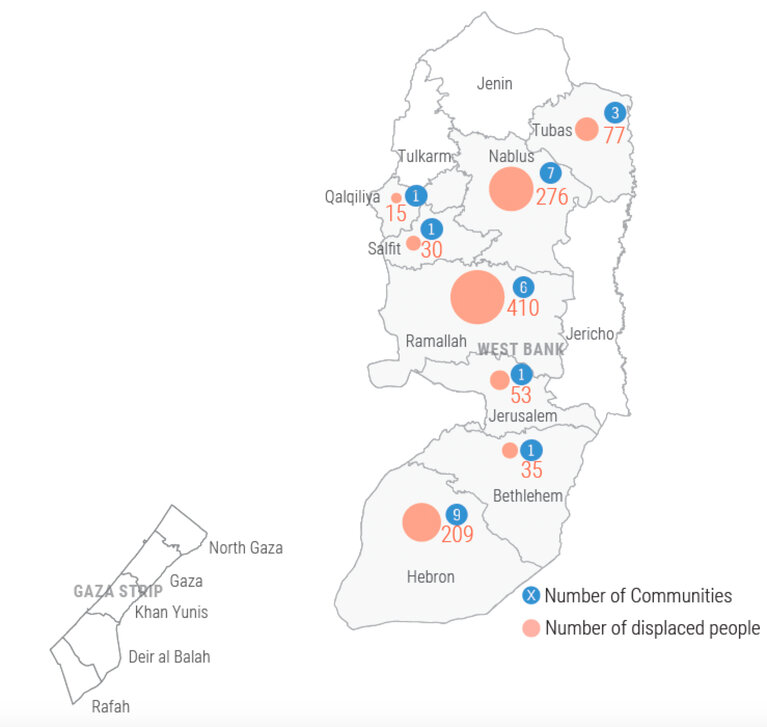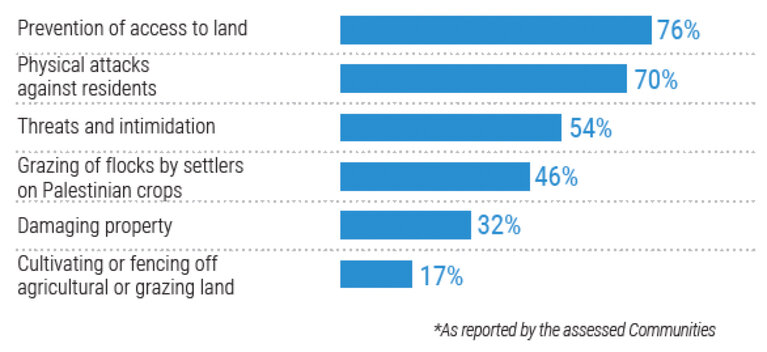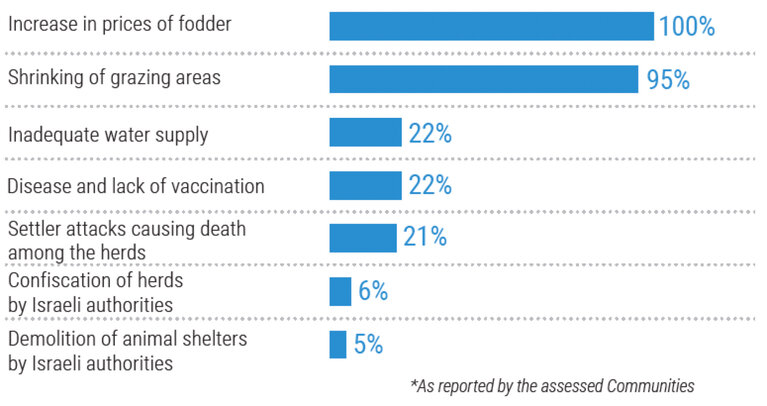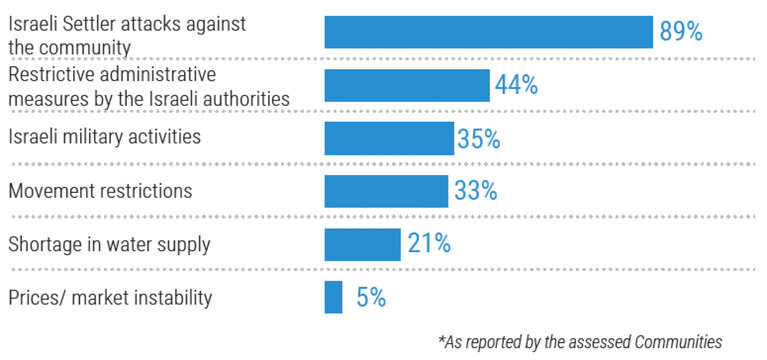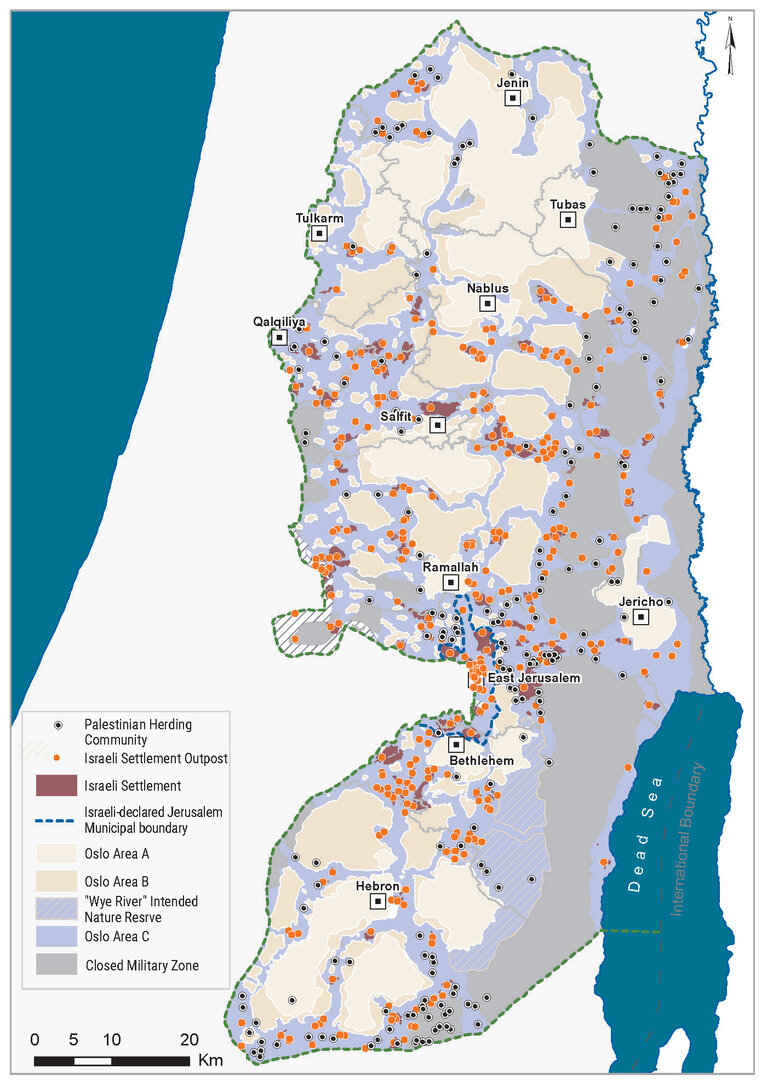Displacement of Palestinian herders amid increasing settler violence
Settler violence has been increasing across the West Bank over the past years. Three settler related incidents per day occurred on average in the first eight months of 2023 compared to an average of two per day in 2022 and one per day the year before. This is the highest daily average of settler-related incidents affecting Palestinians since the UN started recording this data in 2006.
Settler violence incidents*
In August 2023, the United Nations and its humanitarian partners assessed the humanitarian needs of 63 Palestinian herding communities across the West Bank (“the Communities”) through key informant interviews. The 63 Communities, home to around 10,000 people, including 24% of whom are women and 51% children, were selected based on their higher vulnerability level, proximity to settlements and exposure to settler violence.
Population displacement
A total of 1,105 people from 28 Communities – about 12% of their population - have been displaced from their places of residence since 2022, citing settler violence and the prevention of access to grazing land by settlers as the primary reason. Those displaced have moved to towns or other rural areas that they consider safer. Most of those displaced were in the governorates of Ramallah, Nablus and Hebron, which also have the highest number of Israeli settlement outposts. Four Communities have been completely displaced and are now empty, including two that were vacated during the assessment. In six other Communities, over 50% of the residents left since 2022 and in seven additional Communities more than 25% of the community has left. The documented number of people displaced does not include those Palestinian herders that have moved for seasonal reasons, and includes those who indicated their willingness to return if conditions improve.
Displaced people by governorate since 2022 citing settler violence
Types of settler violence
Some 93% of the Communities reported a higher frequency of settler violence and 90% reported that the severity of the settler violence had increased since the beginning of 2022.
Most common settler related incidents*
Change in population size
Comparative data for 41 of the Communities was available from an assessment conducted by the UN and its humanitarian partners in 2013. Twenty-four of those Communities have recorded a 39% decrease in the total population size. In these 41 Communities, the overall population growth was 10% lower than the projected growth rate based on the West Bank average. The Communities that have recorded the highest population growth have their “master plans” approved by Israeli authorities.
Decrease in number of livestock and in cultivated grazing land
Almost all of the Communities (55) reported a decrease in their number of livestock, and at least 90% reported a reduction in cultivated grazing land. Some 79% of Communities stopped accessing land due to attacks by settlers, and 60% cited the expansion of settlements into grazing land or the takeover of land by settlers as reasons for the decrease.
Reasons for the decrease of livestock*
Reasons for the reduction in cultivated land*
Destruction of crops
Some 62% of the Communities that cited settler violence as one of the main reasons for the reduction in access to cultivated grazing land had their crops destroyed by arson attacks, physical sabotage or by settlers grazing flocks on land that Palestinian herders had relied on.
Closed military areas and confiscations
Some 64% of the Communities who cited administrative measures as a reason for the reduction in access to cultivated grazing land were affected by the declaration of a closed military area, which the Israeli authorities often impose following confrontations between Palestinian communities and Israeli settlers. Some 71% of the Communities that cited administrative obstacles had received land confiscation orders, including orders that were acted upon, while 32% of the Communities had all or part of their herds confiscated by the Israeli authorities.
Damage to water sources
Some 66% of the Communities reported that access to water had been negatively affected by settler violence. Of those Communities, 46% reported that settlers had polluted, vandalized or taken over water sources on which Palestinian herders had relied.
Access to health and education
More than half of the Communities who reported education-related obstacles cited settler violence as a reason for the difficulties in reaching education while 36% cited settler violence as affecting access to health care services.
Lack of accountability for settler violence
In 81% of the Communities, residents had filed complaints with the Israeli Police in some or most of the settler violence incidents that they faced. However, only 6% of these community representatives were aware of any follow up actions being taken by the Israeli authorities.
Demolitions
A discriminatory planning regime in Area C prevented 71% of the Communities from building new structures. In all of the Communities, OCHA documented 59 demolition incidents that were carried out by Israeli authorities in 2022 and 2023. As a result of those demolitions, 262 people lost their homes.
Coping mechanisms
To cope with intensifying settler violence and loss of access to grazing land, in 95% of the Communities residents have sold part of their livestock, in 71% residents had borrowed money to pay for fodder, in 35% residents had changed their livelihood and 30% were feeding their livestock with substandard food.
Palestinian herders should be self-reliant based on their established livelihoods. Instead they need humanitarian assistance because of settler violence and the failure of Israeli authorities to hold perpetrators accountable. This, together with Palestinians’ inability to obtain approvals to build, demolitions, evictions, movement restrictions and ongoing settlement expansion create a coercive environment that contributes to displacement that may amount to forcible transfer, a grave breach of the Fourth Geneva Convention.1
In addition to the urgent need for protection from settler violence and an end to the coercive environment, Palestinian herders require support for their livelihoods, including to feed and protect their herds, and humanitarian assistance to address their basic needs for shelter, food, water, education and healthcare.
Palestinian herding communities and their proximity to Israeli settlements and settler outposts
[1] Report of the Secretary General on Israeli settlements in the Occupied Palestinian Territory, including East Jerusalem, and the occupied Syrian Golan. A/74/357. August 2019

